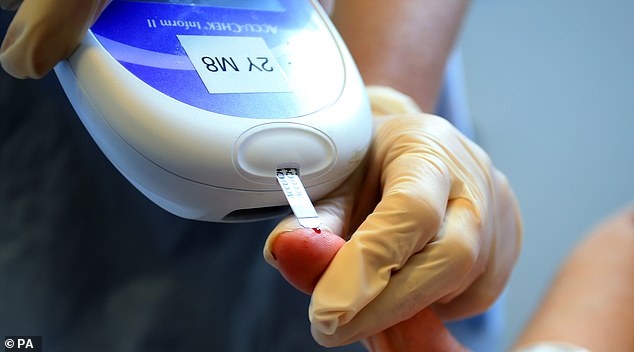One in ten adults are expected to have diabetes by 2030, with the nation facing a ‘ticking timebomb’, experts warned yesterday.
Levels of diabetes have doubled in the past 15 years as a result of spiralling obesity rates, creating ‘a public health emergency’, the charity Diabetes UK said.
If this rate continues, 5.5million Britons will be living with diabetes by the next decade, putting unsustainable pressure on the NHS.

Some 4.1million patients in the UK have been diagnosed with diabetes, and a further 850,000 are thought to have the disease without knowing
Analysis by the charity forecasts an estimated 87,000 hospital admissions for the condition each year by 2030 – 10,000 more than now.
The NHS already spends £14billion a year on care and treatment for those with diabetes, and experts have warned that the crisis threatens to ‘bankrupt the NHS’.
Some 4.1million patients in the UK have been diagnosed with diabetes, and a further 850,000 are thought to have the disease without knowing.
Nine in ten of those with diabetes have the type 2 variant, which is linked to obesity and unhealthy living.
Type 1 is an unpreventable autoimmune disease that usually develops in childhood.
Diabetes occurs when blood-sugar levels rise dangerously. It can lead to complications including heart attacks, kidney failure, stroke, amputation and blindness.
Diabetes UK chief executive Chris Askew said the nation was ‘at the tipping point of a public health emergency’.
The charity claims one in three adults – more than 17million – could be at increased risk of developing type 2 by 2030.
Its data is based on diabetes prevalence projection models from Public Health England and the Association of Public Health Observatories.
Diabetes UK wants to see action to tackle rising obesity rates and put people with type 2 in remission, including tailored weight-loss programmes such as ‘soup and shake’ diets and gastric-band surgery.

Its data is based on diabetes prevalence projection models from Public Health England and the Association of Public Health Observatories
HOW MUCH SUGAR IS TOO MUCH?
The amount of sugar a person should eat in a day depends on how old they are.
Children aged four to six years old should be limited to a maximum of 19g per day.
Seven to 10-year-olds should have no more than 24g, and children aged 11 and over should have 30g or less.
Meanwhile the NHS recommends adults have no more than 30g of free sugars a day.
Popular snacks contain a surprising amount of sugar and even a single can of Coca Cola (35g of sugar) or one Mars bar (33g) contains more than the maximum amount of sugar a child should have over a whole day.
A bowl of Frosties contains 24g of sugar, meaning a 10-year-old who has Frosties for breakfast has probably reached their limit for the day before they even leave the house.
Children who eat too much sugar risk damaging their teeth, putting on fat and becoming overweight, and getting type 2 diabetes which increases the risk of heart disease and cancer.
Source: NHS
Advertisement
It also says more people should be enrolled on the NHS diabetes prevention programme, which aims to help them reach a healthy weight, learn to eat better and make regular exercise a part of their daily lives.
Mr Askew said: ‘Every diagnosis of diabetes is life-changing. The relentlessness of the condition and the ever-present fear of serious and life-altering complications is a life-long reality for millions of families.
‘It’s a sobering thought that if we don’t act today, hundreds of thousands more will face the life-changing news that they have type 2 diabetes.
‘We’re at the tipping point of a public health emergency and need action today to stop it in its tracks.’
He added: ‘It doesn’t have to be this way. We know that with the right care and support, diabetes complications can be avoided and cases of type 2 can be put into remission or prevented altogether.
‘We don’t want our prediction to become a reality. What we need to see is the will, grit and determination from Government to halt this crisis in its tracks and improve the future health of our nation for generations to come.’
Tam Fry, chairman of the National Obesity Forum, said: ‘Twenty years ago, nearly 10 per cent of the population was obese, triggering diabetes and a string of other serious health conditions.
‘Obesity was designated a “ticking timebomb” by England’s chief medical officer, but the Government did little to defuse it.’
Latest NHS figures show every week, diabetes leads to 185 amputations, more than 770 strokes, 590 heart attacks and 2,300 cases of heart failure.
Professor Jonathan Valabhji, national clinical director for diabetes and obesity at NHS England, said: ‘Diabetes can have a marked effect on people’s lives, with higher risks of heart attacks, strokes, limb loss, many of the common forms of cancer, and more severe outcomes with Covid-19.

Diabetes UK says more people should be enrolled on the NHS diabetes prevention programme, which aims to help them reach a healthy weight, learn to eat better and make regular exercise a part of their daily lives
‘As part of its long-term plan, the NHS is already delivering the world’s largest type 2 diabetes prevention programme to support people in reducing their risk of developing the condition, as well as piloting the use of low-calorie diets in those who have recently had a diagnosis of type 2 diabetes in order to achieve remission.’
Children who are fitter perform better than their peers in cognitive tasks, a study suggests.
The study found healthier primary pupils, who ran furthest on a fitness test, completed visual, reading and memory tasks on average 5 to 10 per cent faster and just as accurately after exercise and rest.
The Nottingham Trent University study is in the journal Psychology of Sport and Exercise.
Source link : https://www.dailymail.co.uk/news/article-10062989/One-ten-diabetes-2030-Shock-warning-obesity-crisis-doubles-number-disease.html











